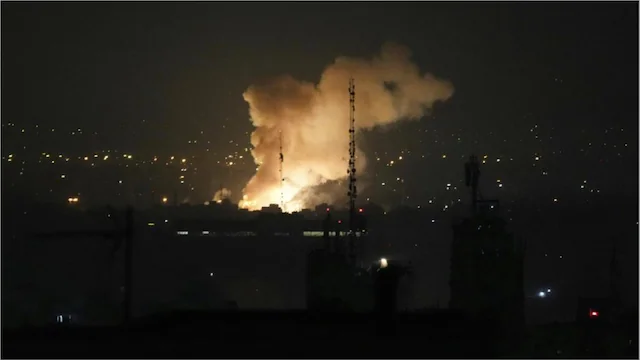In a rapidly shifting geopolitical environment, Israel’s latest military action, Operation Rising Lion, has sparked widespread concern across the Middle East. With tensions already high, these preemptive strikes against Iranian nuclear targets have potentially redrawn red lines and posed serious questions about regional security, diplomacy, and the path ahead for both nations and their allies.
Israel’s ‘Guardian of the Walls’ Operation: Escalation, Fallout and Next Steps
In an action which has dangerously raised tensions in the Middle East, Israel has carried out a series of pre-emptive strikes on Iranian nuclear and military targets, code-named “Rising Lion”. The Israeli government has said it has had to launch the raids in order to prevent Tehran from obtaining a nuclear weapon, calling it a historic turning point for the country.
This daring attack aimed at destroying Iran’s nuclear facilities has taken place at a sensitive moment when negotiations were on the table. With air defense systems throughout Iran turned on and reported explosions in critical Iranian places, and with regional military posture heightened, the strikes may have altered the trajectory of Middle East relations and security for years to come.
Explosions Rock Tehran and Natanz
State television in Iran reported multiple explosions in Tehran on Friday, prompting an outpouring of speculation in the local press and on social media, along with a quick response from the country’s air defense system. These explosions, corroborated by multiple local sources, are thought to be the result of Israeli airstrikes against high-value infrastructure.
Particularly notable were explosions near Iran’s key uranium enrichment plant at Natanz. This facility has long been a focus of Iran’s nuclear program and is often seen as a red line for the international community in terms of Tehran’s ability to build atomic weapons.
The scale and accuracy of the attacks indicated that the operation had been planned to deal a devastating blow to Iran’s ability to move toward nuclear capability while sending a loud geopolitical signal to its leaders.
A Multi-Layered Strike: What Did Israel Hit?
“Rising Lion” was no single strike, Israeli officials said, but a synchronized military campaign hitting at both physical infrastructure and key people identified with Iran’s nuclear effort.
The main targets included:
- Iranian scientists said to be involved with nuclear weapons work
- Missile factories in Iran’s network of military–industrial sites
- The Natanz uranium enrichment facility
- Key Iranian military leaders for strategic planning and missile operations
The wide range of targets suggests that Israel’s mission was not limited merely to damaging Iran’s technical capabilities but also to set-back its human and intellectual resources for nuclear and missile development.
Also read, Miraculous Survival in Deadly Plane Crash: One Passenger Found Alive
Israel Declares Special Situation
All throughout the day the communities in the Tel Aviv district have been under heavy fire.
To guard against the potential for reprisal, Israeli Defense Minister Israel Katz announced a “special situation” in the country. This status means the IDF is on high alert, and can quickly deploy anti-rocket systems.
The threat of missile and drone attacks from Iranian proxies or direct reprisals from Tehran is still very real. The minister said that Israel is ready for more rounds of escalation and that the operation could last for another few days if it will be necessary.
Netanyahu: It’s a Defining Moment
Prime Minister Benjamin Netanyahu delivered a televised address to the nation. His tone was firm when he declared, “We are at a fateful moment in the annals of the state of Israel.” He stressed the attack was a preventive measure for the continued security of the Israeli public.
Netanyahu has long taken a tough line on Iran’s nuclear program and this latest move is in line with earlier threats. His address presented the strikes as both preemptive and defensive in nature, intended to safeguard the regional balance and to prevent the spread of nuclear weapons.
Iran’s Emergency Security Meeting
Iran’s leaders quickly called an emergency national security meeting over the strikes. The discussion and any action to be taken follows reports from Reuters that the allies discussed how to judge the scale of the injury and put in place a response.
Iranian state media reported the attacks but did not provide details on casualties or damage to infrastructure. The country’s senior security and military officials were said to be in attendance, highlighting how seriously Tehran views this escalation.
Although the government’s official response is still coming together, military analysts suggest some sort of retaliation is all but inevitable, particularly because the targeted facilities are so politically and strategically sensitive.
Israeli Sources Say Iran Could Produce 15 Nuclear Bombs
An unnamed senior Israeli military official told Reuters that intelligence estimates indicate Iran has already enriched enough uranium to create 15 nuclear bombs in days. As frightening as the promise sounds, it is unconfirmed by third party sources.
If true, this would do much to raise the stakes for Israel in deciding to strike right now. It also helps explain why one of early targets was the Natanz facility, Iran’s premier uranium enrichment site.
This intelligence assertion lends an added note of urgency to the story Israel is selling: that Iran is teetering on the verge of breakout nuclear capability and that time is running out.
The U.S. Keeps Its Distance
In a measured response, U.S. Secretary of State Marco Rubio underscored that it was not the United States taking action alongside Israel. “Tonight Israel took a giant step backward in the history of peace and national security,” he said. “We aren’t leading strikes against Iran and our top priority is protecting American forces in the region,” he added.
Rubio also warned Tehran unequivocally: “Let me be clear: Iran should NOT target U.S. interests or personnel.”
His message is a bid to draw a bright line between U.S. diplomatic goals and Israel’s military campaign, and yet still suggest readiness to defend American lives and assets if they are endangered.
Trump Responds with Urgency
Minutes after the strike, President Donald Trump called an emergency cabinet meeting, according to CNN. Precise details of what was discussed in the meeting were scarce, but the sense of urgency underscored the possible repercussions of Israel’s moves on American troops and interests in the region.
Significantly, only a day before the attack, Trump had indicated his fear of an Israeli attack on Iran, but he was also hoping against hope for a peaceful way out. His previous remarks shed light on the swift American reaction after the ratcheting-up of tensions.
Nuclear Negotiations in Oman Imperiled
Potentially the most immediate diplomatic casualty of the Rising Lion operation is the pending sixth round of nuclear talks between the United States and Iran, which were to be held in Oman on Sunday.
The discussion, involving Omani intermediaries, sought to capitalize on previous rounds of indirect talks between Tehran and Washington. But as missiles fly and both sides dig in militarily, the prospect of negotiations taking place has dimmed significantly.
From a psychopolitical standpoint, that Israeli action would come just days ahead of the planned talks raises the question of whether Israel’s actions were meant to scuttle those talks or simply a result of perceived urgency in Iran’s progress toward a nuclear capability.
Intelligence Reports and Missed Warnings
Unnamed U.S. officials said that Washington had evidence that Israel was readying a military attack against Iranian nuclear facilities. But the Biden administration did not step in to try to halt or postpone the maneuver.
This choice likely reflects a mix of considerations – a reluctance to get bogged down and a sense that direct involvement might inflame broader conflict. But now, as the situation changes quickly, Washington’s hands-off course will come under fire from both allies and critics.
What Comes Next?
The Operation Roaring Lion is already considered one of the Middle East’s most significant security events. Whether this evolves into a short-term skirmish or a long-term conflict will depend significantly on what Iran does next.
If Tehran opts to retaliate with its own missile attacks, or by mobilizing regional proxy forces, the escalation could enmesh Lebanon, Syria, Iraq or the Gulf states. If Iran, on the other hand, chooses a response that is deferred or symbolic, it would conceivably leave the door open to diplomacy down the road.
The regional powers, including the Saudis, Turkey and the Emiratis, are said to be watching the situation closely and considering their own responses and bracing for the potential of spill-over.
Conclusion
The Israeli air raids launched in Operation Rising Lion took the stakes in the volatile Middle East to a new high. By going after nuclear scientists, missile production facilities and senior military leaders, Israel has issued a bold statement on the willingness to prevent Iran from acquiring nuclear weapons capabilities.
Israel sees the attack as both preemptive and defensive, but Iran may well regard it as an act of war. Now, days later, the region teeters on the brink of an even larger conflict, with American interests in the area now also at greater potential threat.
There may be a glimmer of hope in the form of such diplomatic channels as the talks in Oman, but that hope is increasingly drowned out by firepower, suspicion and emotions running high. As leaders from both sides consider their next moves, the world watches anxiously – in the hope that the way forward leads not to war but to dialogue.
FAQs
What is Operation Rising Lion?
Operation Rising Lion is a series of pre-emptive Israeli strikes targeting Iran’s nuclear infrastructure and military personnel. It is aimed at preventing Iran from achieving nuclear weapon capabilities.
Why did Israel launch this operation now?
According to Israeli officials, the operation was launched to stop what they claim is an imminent threat of Iran developing nuclear weapons. The timing may also be related to ongoing diplomatic talks between Iran and the United States.
How did Iran respond to the strikes?
Iran convened an emergency national security meeting and is expected to retaliate, although official responses and detailed damage reports have not yet been released.
What has been the international reaction?
The United States has distanced itself from the attack while emphasizing the protection of its personnel in the region. Other countries are watching the situation closely for further escalation.
Will this impact nuclear negotiations?
Yes. The planned nuclear talks in Oman between Iran and the U.S. are now in jeopardy. The strikes may derail diplomatic efforts to reach a new nuclear agreement.
Reference
Explosions Rock Tehran As Israel Launches ‘Pre-Emptive’ Strikes On Iranian Nuclear Sites
Stay updated with all the latest news and insights – News Of US






